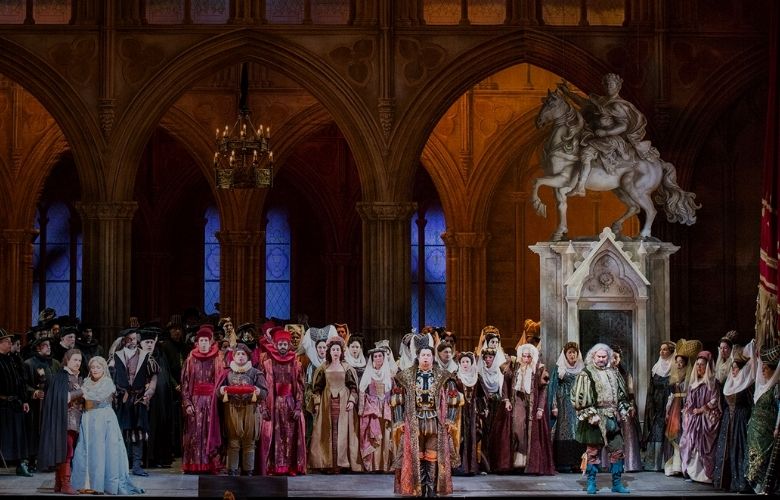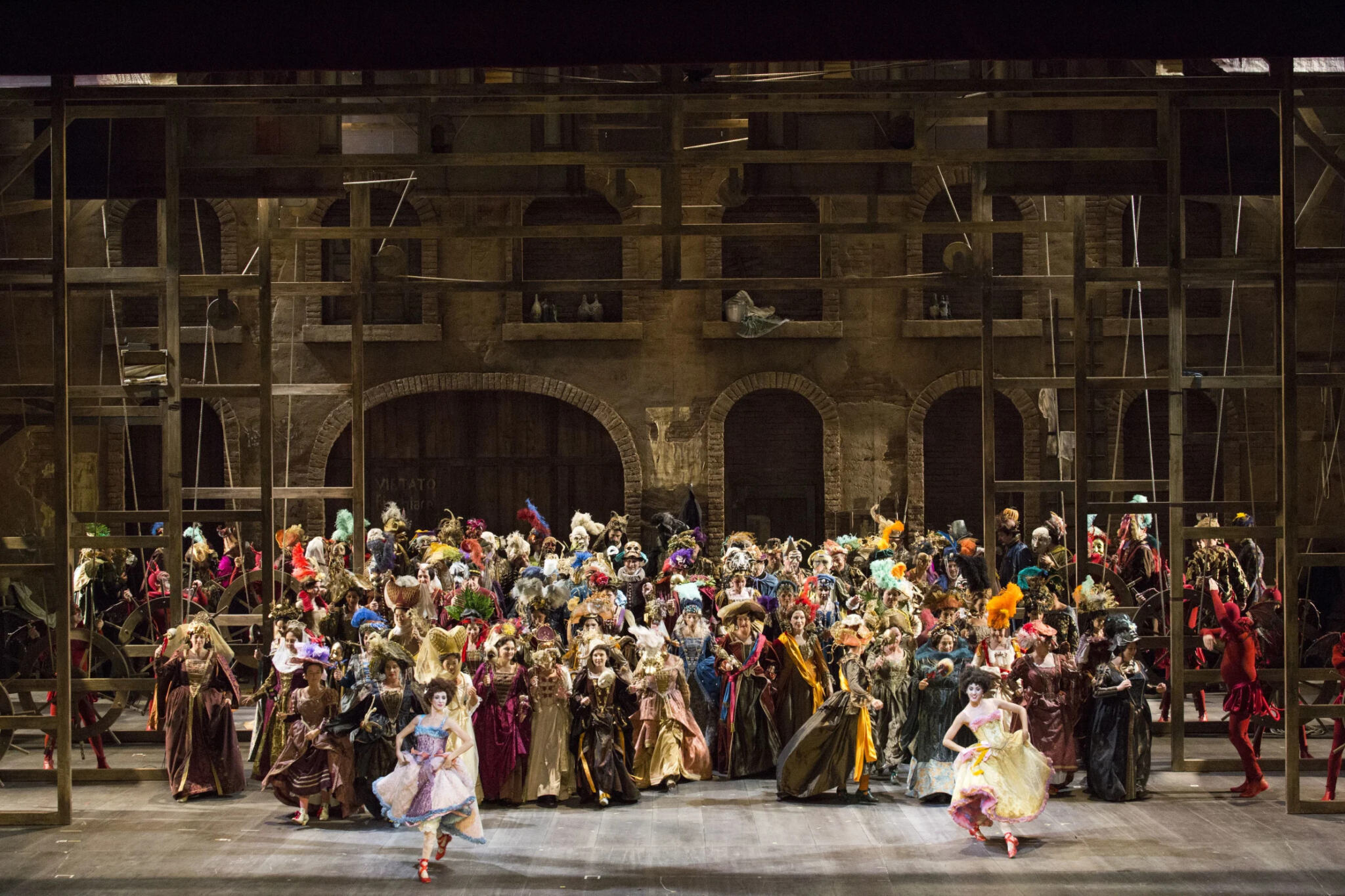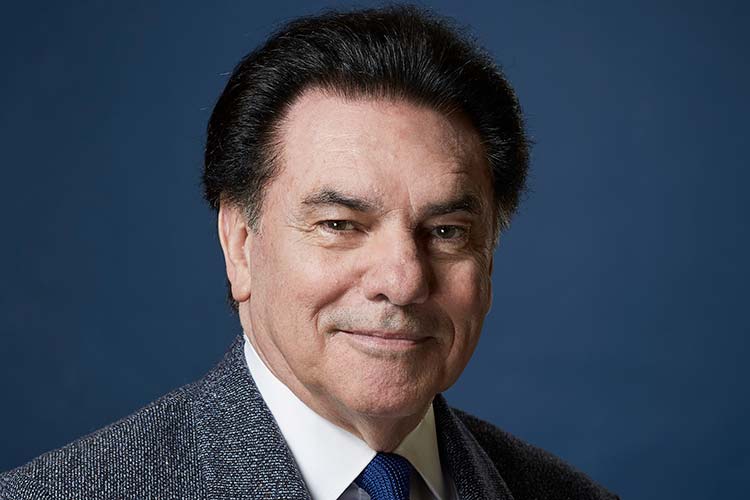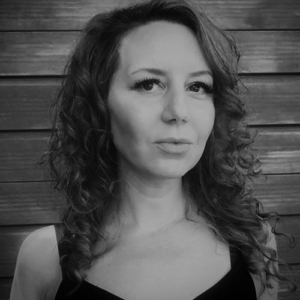
Opera Australia have announced the exciting news that Verdi’s rarely performed Ernani will premiere at the Sydney Opera House this February. To find out more about the production process during these unique times, and to understand the history of Ernani we spoke with Opera Australia’s Artistic Director, Lyndon Terracini, and the show’s Revival Director, Laura Galmarini.
Laura Galmarini is an Italian director and set designer. Born in Italy in 1991, her background includes Arts and Architectural studies. Laura graduated in Set Designer School NABA of Milan with several work experience projects alongside the set designer Margherita Palli. Since 2014 she has been working at Teatro alla Scala as assistant director for more than 20 different productions, working with the world’s leading directors Hugo De Ana, Claus Guth, Bob Wilson, David McVicar, Luc Bondy, Grischa Asagaroff, Jurgen Flimm, Laurent Pelly, Liliana Cavani, Mario Martone and for the historical revivals of Zeffirelli, Chereau and Strehler. Credits include work at Accademia Teatro alla Scala, Cantiere Internazionale d’Arte (Montepulciano, Tuscany), Teatro San Carlo (Naples), Duomo Rooftops (Milan), Festival Puccini (Torre del Lago, Tuscany), Savonlinna Opera Festival (Finland) and direction of L’elisir d’amore (Ragusa, Sicily) with the soloists of Accademia Teatro alla Scala.

I assisted Ernani’s director Sven-Eric Bechtolf at Teatro alla Scala in 2018, when he worked on this show for the first time. That was our second production together, the first one was Hansel und Gretel by Humperdinck, a beautiful show with the soloists of the Accademia of Teatro alla Scala.
I love the style and aesthetic of Mr.Bechtolf’s productions; he can be very oneiric and poetic while also showing the more grotesque and frightful shadows of life at the same time. He explores the deeper areas of the human soul, impressing his realism with a stroke of idealism, to create an utopia from misery. Mr.Bechtolf’s imagination is illusory and dynamic, but it’s based always from harsh reality.
When presented with the opportunity to revive this show at the Sydney Opera House I was so glad to work again on Ernani and to undertake this challenge in a country I had never visited, but which has always enchanted me. My role as Revival Director is to try to maintain all aspects that were crucial for the director during the first creation of the show: actions and gestures, style of the principals, details of the movement of the chorus, wonderful choral scene with the actors. Exploiting the peculiarities of the new theatre machine, I worked with OA’s production and tech crews on all the operational changes regarding costumes, props and set to fit the show to a new Opera House.
In Ernani we can see the genius of Verdi on his way: the big master was young, was learning, was experimenting. Verdi found in Victor Hugo’s Romantic drama the emphasis of the spontaneous expression of individual feelings and passions; characters who were wild, passionate, grotesque, ugly… depicting all colours of life. He needed a piece that could carry his music, a vehicle to show his musical muscles, and Hugo’s Hernani gave him the chance to be fully expressive.
Ernani is often described as an opera that talks about three men in love with one woman. The common love triangle of Romantic Opera, in which the love between Soprano and Tenor, is hampered by the Baritone or the Bass, but it becomes here a quadrangle. Certainly, Ernani is a piece about love, but it’s mostly a piece that talks about honour and revenge. Honour is a very interesting thing and it comes from social hierarchies. The idea of honour today is completely different from that of the time of Verdi, but we all still need a face and some respect to be alive. Very often, the picture of honour we have in mind and the concept of our own respect are more real than the society itself and, sometimes, even stronger than love. And that’s true nowadays.
The health situation in Australia is far better than in other countries, including Italy. Currently, Opera Australia is the only major opera company in the world performing to a live audience.
Of course, this condition requires a massive commitment to tackling pandemic-related difficulties and a special focus on the health of workers. We are fortunate, however, that for now, these new processes have not impacted the artistic choices of the production. Certainly, we work hard to respect and implement the updated government guidelines, while maintaining a creative rehearsal space for our artists. This includes the massive use of facial masks and Opera Australia’s new rapid Covid testing processes.
During my fourteen days of quarantine I studied all the names and faces of the OA Chorus, only to find, on day one, I could not recognise anyone with the facial masks on!! You can understand how important facial expression can be for a director so this is something that I have had to adjust to also.
Bechtolf’s Ernani is a production that is very traditional on one hand, and untraditional on the other hand. The idea of the German director is to present two elements of storytelling – the opera itself, and the story of a little theatre putting on this production. So we have all the characters from the opera – Ernani, Elvira, Silva etc. But we also see the stage hands, seamstress, props makers… It is a metatheatrical show that combines different eras and plays with the historical frame of Verdi’s masterpiece.
Lavish costumes, handpainted canvas scenery, evocative light effects and a technological touch to create a three-dimensional projection effect are the frame for a plot full of passions. An Ernani as our grandparents would have seen it. The double level allows the audience to enter and exit continuously from the story, in a process of illusion and disillusion. It’s a play between the old-fashioned shows and the staging in progress, with all the charm of the ‘behind the scenes’.

Years ago, I worked with set designer Matteo Patrucco on the project The Infinite House. A game for memory. The challenge was to create rooms of memories that could contain the flow of anonymous autobiographical tales. Places evoked or barely hinted at are visualised, and although full of meaning, are impalpable, but become theatre of the story and new narrative spaces themselves. Theatres of memory as an anthology of identities; fragments of a past biography which become the basis for new stories. Building with memory in order to create a new one.
Sydney Opera House defines itself as a place “Where memories are made”. What better place to enjoy a souvenir-based experience in which the absolute star is the most evocative and impalpable instrument, the music itself?
Lyndon Terracini is the Artistic Director of Opera Australia, and has also enjoyed a highly successful international opera career as well as a successful career as an actor, director and writer. Lyndon Terracini was appointed Artistic Director and CEO of the Queensland Music Festival in July 2000 and directed the 2001, 2003 and 2005 festivals. He was appointed Artistic Director/CEO of Brisbane Festival in 2005 and Artistic Director/CEO of Major Brisbane Festivals in November 2007.
In June 1999 Lyndon Terracini was awarded an Honorary Doctorate in Music Theatre by Central Queensland University. In February 2000 he was awarded a Fellowship by the Music Fund of the Australia Council for the Arts. In 2001 he was awarded an Honorary D. Univ. from Southern Cross University and in July 2005 he was awarded the Dame Elisabeth Murdoch Cultural Leadership Award by Australian Business Arts Foundation (AbaF). In 2005 Lyndon Terracini was also appointed Adjunct Professor at the University of Queensland. In 2007 he was awarded a D.Univ. from Queensland University of Technology (QUT).
He was also a member of the International Jury for the Venice Biennale for Music and Savonlinna Opera Festival, and delivered the 2011 Peggy Glanville-Hicks address. In 2014 Lyndon’s service to the performing arts as an opera performer, director and administrator was recognised with a Member of the Order of Australia (AM) in the Queen’s Birthday Honours. In 2018 Lyndon was awarded one of the highest civilian honours in Italy, Commander of the Order of the Star of Italy (Commendatore dell’Ordine della Stella d’Italia).

Giuseppe Verdi is one of the greatest operatic composers who has ever lived and every major opera company has to have the Verdi operas as a pillar of the repertoire. Verdi is one of the fundamentals of opera, with Puccini, Mozart, and, to a lesser extent but nevertheless with Carmen and The Pearl Fishers, Bizet. You’ll see every major opera company in the world has those composers as a core part of their repertoire and then you’ll add on someone like Wagner. So Giuseppe Verdi is not only of major importance to Opera Australia but to every major opera company in the world. As such, we have been performing Verdi’s works since the Company was founded.
No. I think it’s a wonderful piece and I’ve wanted to do it for a long time. Opera Australia had never staged Ernani so it’s the first time it has been staged here by us. It’s a very difficult piece to do, so you can only do it when you’ve got the right people and all the stars aligned for this year; we’ve got a phenomenal cast, one of the great Verdi opera conductors in the world, and I wanted to do it as a co-production with La Scala which is really the home of Italian opera. All of those things worked out and so it was obviously the right time to do it. It’s a fantastic piece but it’s difficult to sing, to play and to stage, so you have to have the right people or you shouldn’t even attempt it.

Everything is moving forward really well. We have magnificent sounds coming from the rehearsal rooms and are looking forward to getting down to the Sydney Opera House and seeing all the different elements come together on the set, with the costumes, the orchestra and the performers.
We are of course keeping an eye on the progression of the pandemic and have experts providing advice and updates multiple times a day. We have certainly made many adjustments to ensure everyone’s safety – from our staff, artists and crew to the audience members. Everyone at The Opera Centre, where we prepare, must wear a mask at all times.
In rehearsals all windows are open to keep the air flowing and we have limited numbers of people who can be in each room at any time. We are testing all of our artists every couple of days and all staff are required to isolate at home if they’ve been near a Covid hotspot.
For the audiences, we are abiding by the Covid safety plans of the Sydney Opera House, requiring everyone inside the venue to wear a mask and seating is physically distanced. Even in the pit on the nights of the performances, the conductor and orchestra members wear masks, except for when the woodwind and brass players are playing their instruments.
It is different but it is wonderful to be back in the theatre. When we opened our first show of the year, The Merry Widow on January 5th, everyone was thrilled to be hearing opera again and it was quite emotional.
The Ring Cycle is a major achievement for any opera company that can do it, and to have real credibility you have to be able to be doing The Ring on a regular basis. It’s sort of the olympics of classical music or certainly classical opera. When we first did it in 2013 the Company was 60 years old and we’d never managed to do The Ring, so it was important to do it and we did it twice within three years. We’re doing it again this year and I hope we’ll go on playing it every three or four years for the next 12 years at least.
It’s important too for us to play in Queensland. In my view we should be playing regularly in Brisbane, Sydney and Melbourne as well as touring to other places in Australia. Presenting the classics is necessary as they form the fundamentals of our repertoire, but we also do look to balance each season with a variety of music. The Ring is a classic. It’s one of the most phenomenal achievements in the history of Western music, or the history of Western art, not just in music.
The things that you might balance with Verdi, Puccini, Mozart, Bizet and Wagner is something like Bluebeard’s Castle. It’s a fantastic piece, which we’ve also never ever done before, but it is a bolted on opera audience and does have a smaller audience. Our first show of the season, The Merry Widow, is a very popular opera and great for people who’ve never been to the opera before whereas Bluebeard’s Castle is primarily for a more sophisticated audience. So, it was important to balance The Merry Widow with something like Bluebeard’s.
There are so many things that I’d like to do! But particularly at the moment, because of financial restraints and also the impact Covid has had on bringing artists here, unfortunately I won’t be able to do a lot of them. Ideally that will change fairly quickly and maybe we’ll be able to realise some of those things.
I’m hoping that, once the vaccine has been distributed and administered to a much wider community, borders will open up and we can welcome our international friends, visitors, and supporters as well as the international artists that we work with. And that applies too to Australian singers who are based here but work overseas – it’s important for them to be working all over the world, as it is for international singers to be working here.
Opera Australia’s Ernani will run from 2-13 February at the Sydney Opera House
We have Great Opera Hits running at the moment until March 3 – a 90 minute concert series jam-packed with famous masterpieces sung by some of Opera Australia’s finest young principal artists. Described as the ‘best of opera without the boring bits’, it is a lovely night out for those itching for live entertainment who want to experience the atmosphere of opera without committing to a grand opera production.
Links:
The Ernani ‘Cheat Sheet’
Opera Australia Website
Opera Australia on Facebook
Opera Australia on Twitter
Opera Australia on Instagram
Opera Australia on YouTube
Accessibility At The Smith Center Series: Part One
James “Fitz” FitzSimmons Interview: The Boys In The Band On Netflix


Michelle is a musician and composer from the UK. She has performed across the UK and Europe and is passionate about arts education and opportunities for women and girls.
Read Full Profile© 2021 TheatreArtLife. All rights reserved.

Thank you so much for reading, but you have now reached your free article limit for this month.
Our contributors are currently writing more articles for you to enjoy.
To keep reading, all you have to do is become a subscriber and then you can read unlimited articles anytime.
Your investment will help us continue to ignite connections across the globe in live entertainment and build this community for industry professionals.